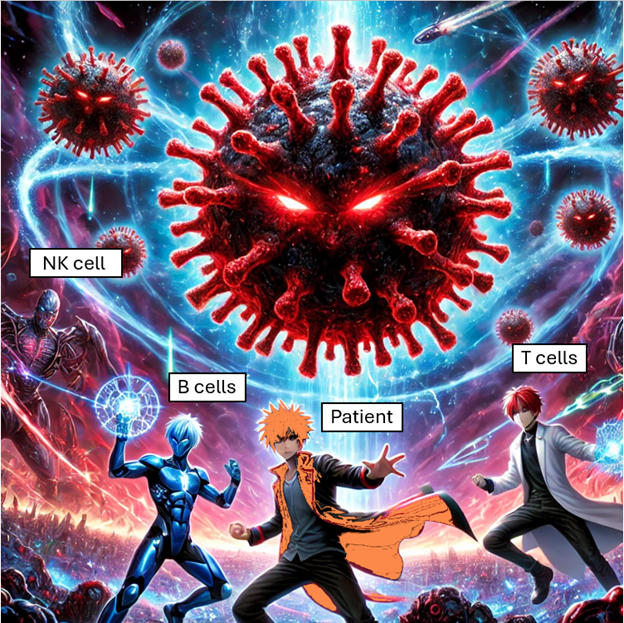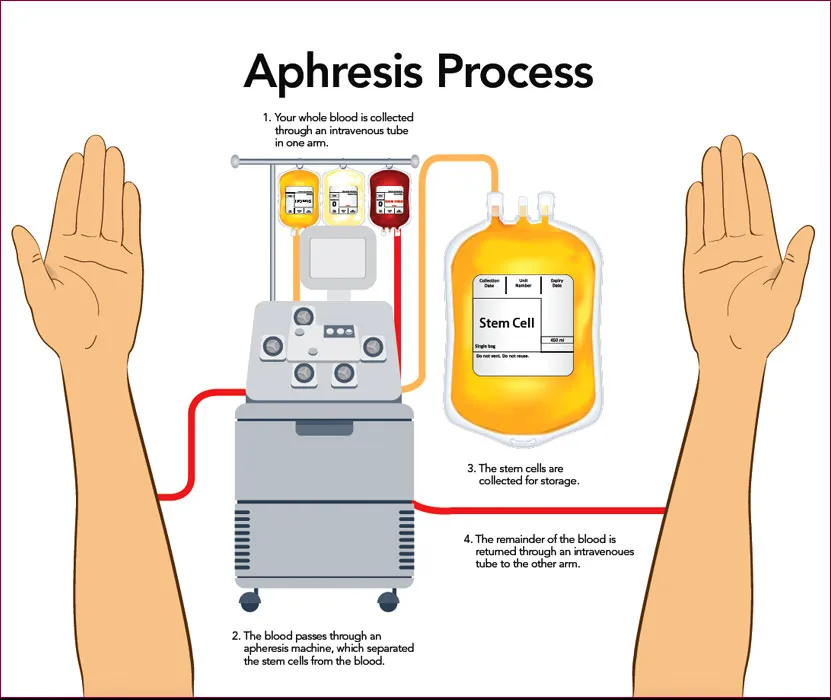The Relationship Between Epstein-Barr Virus, Auto-Immune Disorders, and Long-Term Effects of COVID-19
The Relationship Between Epstein-Barr Virus, Auto-Immune Disorders, and Long-Term Effects of COVID-19
By Adrian Saltrese and Dr. Dipnarine Maharaj MD, FACP

Many of us have heard of the Epstein-Barr Virus (EBV), but what many of us don’t know is that it can age our immune system and shorten our lives. EBV is an extremely successful human herpes virus, which infects essentially all human beings at some point during their lifespan, putting a large percentage of the population at risk. EBV infection and the consequent immune response results in the production of antibodies, which occurs mainly during the first years of life, but may also happen during adolescence or adulthood. Furthermore, there is additional risk for the development of long-term COVID-19 syndrome for individuals with latent or chronic EBV infections.
Most people are infected by EBV in early childhood. It usually causes no symptoms or only a brief, mild illness. When teens or young adults become infected, it can cause infectious mononucleosis, or “mono.” The symptoms of “mono” include extreme fatigue, fever, sore throat, and swollen lymph nodes. Moreover, since the virus can switch between a latent and a lytic life cycle, EBV can cause chronic relapsing/reactivating infections. After infection, EBV becomes dormant, and people remain infected throughout their lives. Transmission of EBV mainly occurs through saliva. This is the reason why mononucleosis is commonly known as the “kissing disease.” EBV can shuttle between different cell types, mainly B cells and epithelial cells. Chronic or recurrent EBV infection of epithelial cells has been linked to systemic lupus erythematosus and Sjögren’s syndrome, whereas chronic/recurrent infection of B cells has been associated with rheumatoid arthritis, multiple sclerosis, and other diseases.
The immune system has a variety of cell types that act in unison to protect the body from invading microbial threats, including B Cells, T Cells, and natural killer (NK) cells. B cells, for example, produce specialized molecules called antibodies that attack harmful microbes. Autoimmune diseases arise when this complex system mistakenly attacks the body’s own tissues. Since EBV is known to infect B cells, chronic and recurrent infections may result in immune dysfunction by degrading their function. Certain strains of EBV have also shown the capability to infect T Cells and NK Cells. Chronic infection of EBV leads to a chronic activation of T Cells and altered cytokine expression resulting in systemic inflammation. Studies also show that many long COVID symptoms may not be a direct result of the SARS-CoV-2 virus but actually may be the result of COVID-19 inflammation-induced EBV reactivation.
The Maharaj Institute offers an immune panel to measure the immune system and markers of inflammation with blood testing. This test provides an extensive profile of the innate and adaptive systems of the immune system as well as markers of inflammation. This test includes B cells, T cells, NK cells, and NK cell function. The exam will separate the NK cells and mix them with a target tumor cell to see how well the NK cells can kill the target.
If the NK function is low, our treatments can stimulate and boost their function while restoring the immune system. For individuals who know they have been exposed to EBV in the past, it is crucial to examine their immune system due to the increased risks for autoimmune disorders. It is always better to catch and identify root causes of an illness before disorders advance and treatment options become limited.
Please call Dr. Maharaj at 561-752-5522. https://maharajinstitute.com/ to see how he and his team can help you measure and maintain your healthy immune system as well as to test and measure your inflammation. These are non-invasive tests that will provide a clear picture of where your immune health lies, and should it reflect abnormalities, we have the resources to help correct them. We look forward to hearing from you at the Maharaj Institute in Boynton Beach, Florida at 561-752-5522 or info@bmscti.org. Visit us at https://maharajinstitute.com
References:
- Coleman, C. B., Wohlford, E. M., Smith, N. A., King, C. A., Ritchie, J. A., Baresel, P. C., Kimura, H., & Rochford, R. (2014). Epstein-Barr virus type 2 latently infects T cells, inducing an atypical activation characterized by expression of lymphotactic cytokines. Journal of Virology, 89(4), 2301–2312. https://doi.org/10.1128/jvi.03001-14
- Gold, J. E., Okyay, R. A., Licht, W. E., & Hurley, D. J. (2021). Investigation of long covid prevalence and its relationship to Epstein-Barr virus reactivation. Pathogens, 10(6), 763. https://doi.org/10.3390/pathogens10060763
- Houen, G., & Trier, N. H. (2021). Epstein-Barr virus and systemic autoimmune diseases. Frontiers in Immunology, 11. https://doi.org/10.3389/fimmu.2020.587380
- Trempat, P., Tabiasco, J., Andre, P., Faumont, N., Meggetto, F., Delsol, G., Gascoyne, R. D., Fournie, J.-J., Vivier, E., & Brousset, P. (2002). Evidence for early infection of nonneoplastic natural killer cells by Epstein-Barr virus. Journal of Virology, 76(21), 11139–11142. https://doi.org/10.1128/jvi.76.21.11139-11142.2002
- U.S. Department of Health and Human Services. (2016, August 9). Approach targets autoimmunity. National Institutes of Health. Retrieved February 8, 2022, from https://www.nih.gov/news-events/nih-research-matters/approach-targets-autoimmunity
- U.S. Department of Health and Human Services. (2018, May 1). Epstein-Barr virus and autoimmune diseases. National Institutes of Health. Retrieved February 8, 2022, from https://www.nih.gov/news-events/nih-research-matters/epstein-barr-virus-autoimmune-diseases
Request An Appointment
Please fill out the form to request an appointment. We will contact you shortly to confirm the exact day/time.



